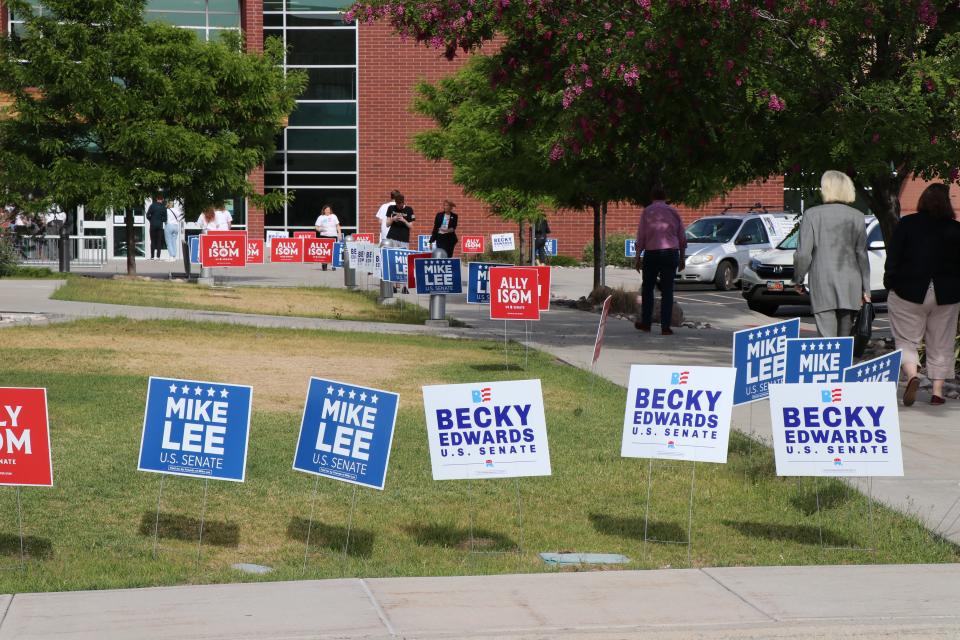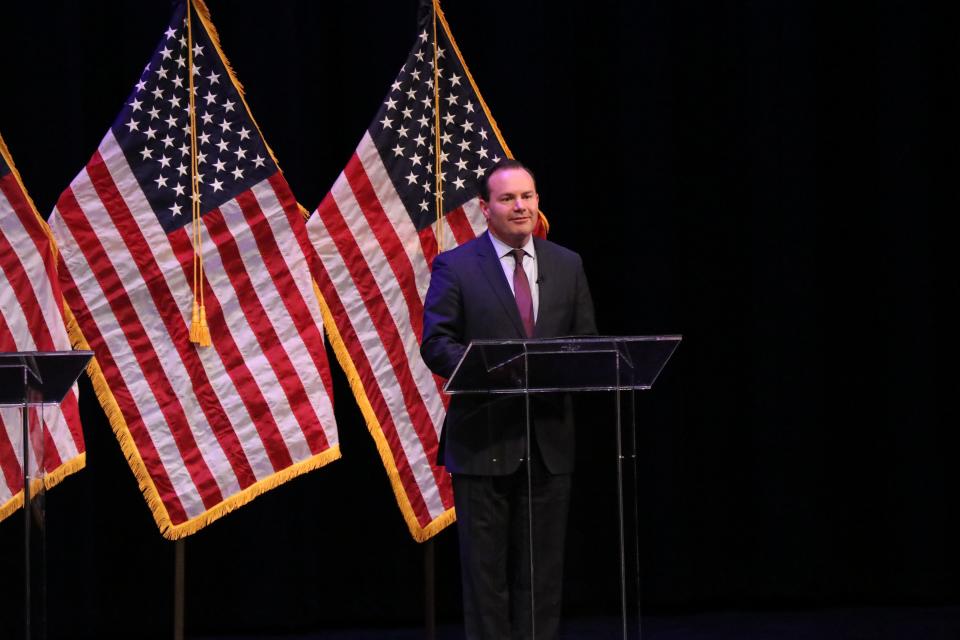Senate candidates Lee, Edwards and Isom debate over public lands, water, abortion and more
Becky Edwards and Ally Isom, the two Republican challengers taking on incumbent U.S. Sen. Mike Lee in this month's primary election, had their chance to take him on face-to-face on Wednesday.
In what will likely be the only debate featuring all three candidates ahead of the June 28 election, they met in Salt Lake County and debated a range of topics, including growth, water scarcity, how Utah's public lands should be treated and abortion rights.
Lee, a two-term incumbent, faces two candidates with plenty of experience in state politics. Edwards served 10 years in the Utah Legislature as a state representative and Isom has been a high-level staffer for prominent Republicans including former Utah Gov. Gary Herbert.

More: 2022 Primary: Utah's Senate candidates answer questions on drought, growth, politics
The debate was sponsored by the Utah Republican Party and is currently the only debate scheduled with all three candidates. Another was scheduled for Thursday night, hosted by the non-partisan Utah Debate Commission, but only Isom and Edwards have committed to attending. Lee has said he won't attend and is instead holding a meet-and-greet event that night with other Republican candidates in Vernon Worthen Park in St. George.
With Wednesday's debate being moderated by the chair of the Utah Republican Party, Carson Jorgensen, the questions focused heavily on popular national conservative topics like abortion, inflation and energy prices, leading to some generic talking points from the candidates. But it did give a chance for Lee's challengers to hit out against the incumbent and rail against the "ineffective" leadership that has been in Congress for the last 12 years, saying it is time for a different voice to represent Utah in the Senate.
Public Lands
The issue of leadership was brought up often when the candidates talked about the future of Utah public lands. Both Edwards and Isom took shots at Lee for not being able to pass legislation on the issue.
Edwards said a Senator needs to be able to work in a bipartisan way to find a sustainable future and that if Congress can't find solutions the responsibility would simply swap back and forth between whichever party controls the White House.
"Because Congress is so ineffective, it's led to a leadership vacuum that the executive branch has stepped right into," Edwards said. "Over and over it has continued to have this ping-pong approach with designation and then pulling it back and then re-designating public lands to the tune of hundreds of millions of acres is leaving communities across the state behind."

Edwards then said she would want to strike a balance where public lands can be accessed for business purposes and that energy production on public lands should be prioritized.
Lee, who has been bashing the federal government on public lands issues for over a decade, said the high amount of federally owned land in Utah costs the state in lost potential property tax revenue. He said that to improve Utah's relationship with public lands, Congress should pass his recently-introduced More PILT Act, which would require the federal government to look at how to increase payouts to counties where there is a large amount of federal land.
"Our communities have been starved for cash for too long," he said. "They're not able to get by and responsible for maintaining services for that land that they can't tax it. That's not fair. It would also help incentivize in equalization of federal landowners."
Lee's bill is currently being held in committee.
Isom said the bill doesn't mean much because it stands little chance of actually getting passed or enacted into law.
"I'm sick and tired of career politicians who will sponsor bills with catchy titles that make your great cable TV that never get them across the finish line," she said.

Isom argued she would work to force the federal government to step out of the way and allow more energy development, saying a free-market approach would work.
Challenges of Growth with Water
Utah consistently ranks as among the fastest-growing states by population, and all three candidates said they agreed that addressing water issues is key for the state's growth.
Isom and Edwards both said more bills like the recent bipartisan infrastructure bill that set aside millions for water projects would be key since more storage and treatment facilities are needed across the state.
Isom said that water is the number-one issue for every community she has visited in her campaign and that she supports water conservation measures, including stopping culinary water from being used outdoors and widespread water metering. She also said it's key that Utah's federal delegation needs to be a strong advocate for the state when negotiating with other states on how to bring water to Utah.
"We have storage issues and infrastructure issues," she said. "It requires real leadership. It requires somebody willing to bring everyone to the table and have the bigger conversation."
Edwards said conversations around the use of water from the Colorado River are key for the state and that because so many states rely on the water, any resolution must be done in a bipartisan way.
"We have to be able to have conversations with Democrats from other states and work to get things done in a bipartisan way to make sure that we access all of the resources we need," she said.
Lee said it was vital for more water infrastructure projects to be approved in Utah but that the National Environmental Policy Act makes it too difficult for projects to get approval. He pointed to the Lake Powell Pipeline as an example of a positive water project.
"Things like the Lake Powell Pipeline project are essential to the growth of many parts of the state," he said. "We've got other projects like that in different parts of the state that desperately need water so that we can keep up."

Lee said that to expedite these projects the government could put strict "shot clock" limits on how long the NEPA review processes should take for infrastructure projects on federal land.
Abortion
With the Supreme Court primed to make a decision that could end abortion rights that were gained through the Roe v. Wade case, the right to access an abortion will fall to both federal and state governments. Utah already has a trigger law in place if Roe v. Wade is overturned that bans abortions unless there are special circumstances like if the pregnancy is not medically viable or is a result of rape or incest.
Most of the candidates supported the decision to end Roe v. Wade. Lee said the Supreme Court never had the authority to make that decision and argued that nothing in the 235-year-old U.S. Constitution supports abortion. Isom said it's a "complex issue" that should involve women in elected office but that she supports in general restricting abortions in most scenarios.
"I'm not just for life. I'm for consent," Isom said. "I'm against violence, and I'm for family planning and for improvements in the way we talk about sexual education with our children. We've got to do all we can to prevent unwanted pregnancy in the first place."
Edwards broke from the other candidates on the issue, saying her experience as a social worker who's been in hospital rooms with women considering abortion has shaped her thoughts on Roe v. Wade.
"It's for women like that, and so many other young girls who have experienced rape, women with disabilities who have experienced being taken advantage of for their entire lives on repeat," she said. "It's for those individual circumstances that my heart goes out and I understand, we have to have conversations that are thoughtful, productive and meaningful on this issue."
For those reasons, she said she doesn't see a need to revisit Roe v. Wade but that if it is overturned she would support each state's individual decision on abortion access.
Other issues
Many other issues were discussed during the debate that had wide agreement among the candidates. All said that too much federal spending is the cause of inflation, that America needs to boost its energy production in order to make gas cheaper, and that immigration reform needs to happen so it's easier for legal migrants to come but that security on the border needs to be improved.

All the candidates repeatedly blamed the Biden administration for issues like high gas prices and inflation and all said Republicans should be focused on retaking the majority in both houses of Congress.
The candidates also all agreed with Marlo Oaks, the Utah State Treasurer, that ESG — environmental, social, governance — scores, which determine how well a company is performing within those metrics, are a tool that can be used to force a political agenda on a company.
Sean Hemmersmeier covers local government, growth and development in Southwestern Utah. Follow on Twitter @seanhemmers34. Our work depends on subscribers so if you want more coverage on these issues you can subscribe here: http://www.thespectrum.com/subscribe.
This article originally appeared on St. George Spectrum & Daily News: Senate candidates Isom, Edwards take aim at Mike Lee in Utah debate
